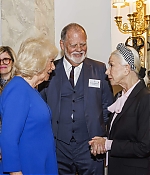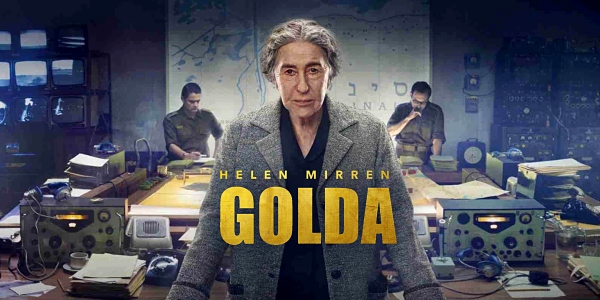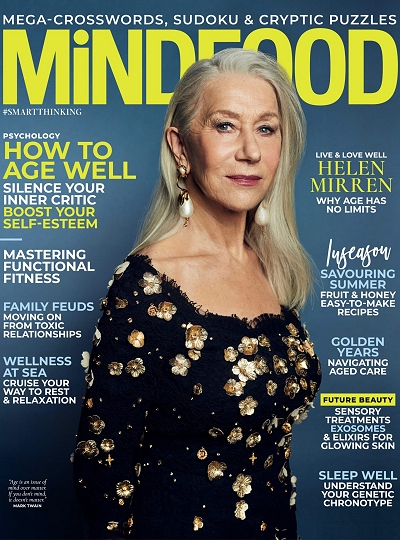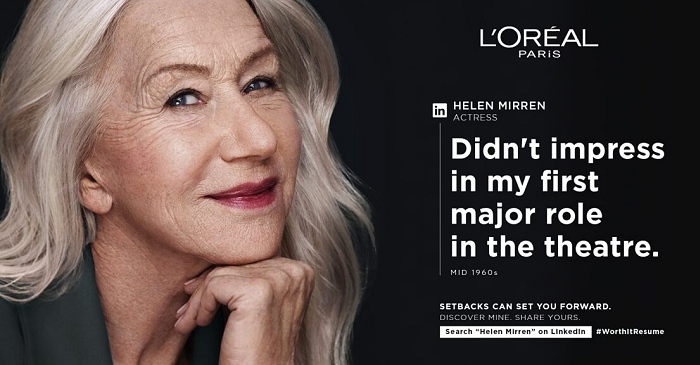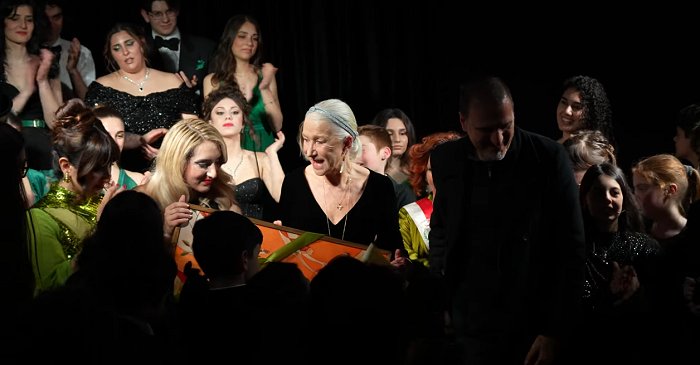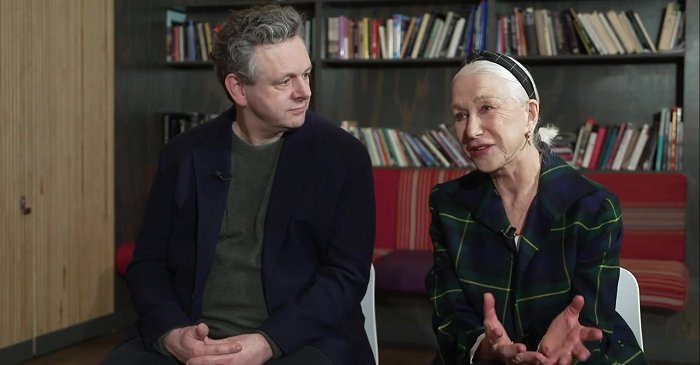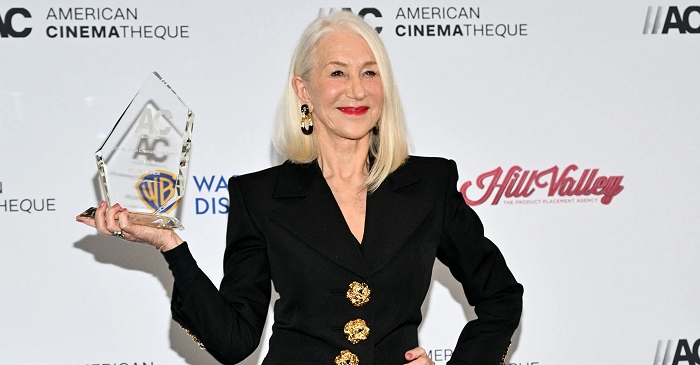
|
Welcome to The Helen Mirren Archives, your premiere web resource on the British actress. Best known for her performances with the Royal Shakespeare Company, "Prime
Suspect" and her Oscar-winning role in "The Queen", Helen Mirren is one of the world's most eminent actors today. This unofficial fansite provides you with all latest
news, photos and videos on her past and present projects. Enjoy your stay.
|
Celebrating
10 years
on the web
|
The day before I meet Helen Mirren I watch her first ever talk show appearance. It’s about as hard to find as the Queen’s Balmoral residence.
Just stick “Helen Mirren” and “sexism” into Google and there it is, at the top of the 37,100 results, clearly signposted “The sexist Parkinson interview”. “Oh really?” she says gleefully. “That’s what it’s called? I love it. Love it! You see now there is no escape.” The year was 1975. Mirren was 30 years old and a rising star at the Royal Shakespeare Company. Correction. She was “Stratford’s sex queen”. Never mind that she had auditioned for the National Youth Theatre at 18 and was treading the boards as Cleopatra at the Old Vic two years later. Forget that she had toured France and North Africa with Peter Brook’s freewheeling experimental troupe of actors, dancers and musicians. According to the army of panting male critics who couldn’t take their eyes (or their pen) off Mirren’s “stirringly voluptuous” curves, she was less classically trained actress and more classic male fantasy.
Parky was no exception. He introduced Mirren by quoting a critic’s description of her “sluttish eroticism”. He talked about her “equipment” and drew speech marks in the air when he referred to her as a “serious” actress. The interview, seen from a post-Andy Gray and Richard Keys viewpoint, is at once shocking in its casual, unchecked sexism and totally unsurprising. “Well, quite,” says Mirren, raising perfectly plucked eyebrows into tiny rainbow arches. (Yes, her face moves. It shouldn’t be worth mentioning, but it is.) Then comes the punchline. “He does like cricket more than anything in the world.” Mirren smiles imperiously. (Another revelation: her teeth aren’t perfect either.). Her small, expressive eyes glitter with mischief. A friend told Mirren about the interview being on YouTube and she watched it recently for the first time in decades. “It was the first talk show I’d ever done,” she says.
“I’d done very few interviews of any sort. When I came off I was shaking. Well I was shaking when I went on. But I was graceful. I was trying to be funny … I didn’t let him get away with it. I thought I was fantastic. I didn’t really get credit for it until now. Nobody noticed at the time. They didn’t notice how sexist he was and they didn’t notice how well I handled it.” It’s true. Mirren may not have been crowned (her Oscar for The Queen came 31 years later) but she was no less regal in 1975. What’s interesting about her then and now is her rare mix of nerves and arrogance, tough and tender. Ironically, it’s what makes her so sexy, the thing that no one notices because they’re too busy lusting after her curves. Mirren never plays the victim (on screen or off) but she remains disarmingly artless. She’s not one for hiding an emotion or an opinion, which is why she’s got into trouble for saying things like she used to love cocaine and isn’t sure whether consensual sex under the influence constitutes rape. All that power and uncontained feeling is incredibly appealing. Then add to that the fact that she is ferociously smart, an intellectual who can converse on subjects ranging from Lady Gaga to chamber music, Francis Bacon to Russian history, photography to her beloved acting, and you really understand why she has such magnetism. And yes, OK, why she is so sexy.
We meet in a London hotel. It’s three days after the Oscars, where Mirren presented an award with Russell Brand who is also in her new film The Tempest and has a massive crush on her. (He has called her “our punk queen” and said he wants to snog her.)Mirren, with the director Taylor Hackford, whom she married in a parish church outside Inverness in 1997, looked as resplendent as ever in gun-metal Vivienne Westwood and platform heels. She wasn’t nominated, though last year she was up for Best Actress for her histrionic performance as Sofya, Tolstoy’s wife in The Last Station. “The poor Oscars, they always get slammed in the press,” she says. “They all watch it none the less, with their knives ready. I love seeing all the movie stars and the dresses.” What did she get up to? “I didn’t go to all the parties this year. My dress was hurting. You get ready at 3pm so by 11pm you’ve been in that dress and those shoes for a long time.”
Before Mirren arrives, I watch four publicists pontificating over how many drinks she will want during the interview. “Has Helen had a cappuccino today?” someone asks. “Just one,” replies her publicist sagely. “She may want another.” I start to think Mirren might actually be a bit like the Queen and remember that she once joked: “I don’t mind if I don’t have any lines as long as I get to wear a crown”. We’re all wrong. She strides into the suite and says she doesn’t want anything. No coffee, no water, no pastry because “I’ve put on seven pounds”. Then she turns to me, gives me an Oscar-winning smile, and says: “Would you like anything?” She looks fantastic. Not for her age, just fantastic. Her hair is feathered and silvery blonde and her slim gold earrings bob around as she talks. Her skin is pale, her cheeks appley and her wrinkles in all the right places. She is wearing lots of shades of burgundy with matching claret nails and the overall effect is of a very expensive, vintage wine. On her left hand she has a tattoo of a star, the result of a messy drunken night in Minnesota in her 20s. “I will never have it removed,” she said to Parkinson in that interview. And she has remained true to her word. She is also wearing high-heeled leopard print shoes. “Don’t get me wrong,” she says when I ask whether the sex symbol label still grates, which it does. “I want to look nice. I’m still a woman. I love wearing my leopard shoes.” She raises a slim leg above the table, twirls her ankle like a parasol, and gives me her best salty Southend-On-Sea cackle.
“I love to dress up. But that’s just me. I don’t want to lay it on anyone else. If I’m held up as some sort of symbol that you have to be sexy in your 60s, well why the f*** do you have to be sexy in your 60s? You don’t. You just have to be content and happy and hopefully healthy.” So it feels like another pressure? “Yes,” she says. “But I’m not putting it on people. I don’t see myself that way. And it’s very often women journalists. They say things like, ‘Tell me the secret of how you look so good?'” She rolls her eyes. “Go away! Don’t do this to other women. Don’t use this interview in that way.” Suddenly I feel like she might be warning me. The Tempest is an adaptation of Shakespeare’s last play directed by Julie Taymor (Frida, the stage production of The Lion King). It’s another staggering performance from Mirren. She plays Prospero, the mighty sorcerer exiled to an “enchanted isle” who represents power, revenge, old age and some of the most dense poetry Shakespeare ever wrote. It is one of the great Shakespearean roles. One of the great male roles. Until, that is, Mirren saw Derek Jacobi playing Prospero on stage and thought: “Why not Prospera?””I decided if anyone asks me to do Shakespeare again, that’s what I’ll suggest. The whole of the early part of my career was nothing but Shakespeare, but there was no role I wanted to play. I had done Cleopatra three times, the last one rather disastrously.”
Mirren met Taymor at a party and the director was thrilled by the idea. It’s testament to just how respected Mirren is that a year later a call came through inviting her to Hawaii to do it. Mirren’s Prospera is a weather-beaten, stern but loving, tired but strong matriarch. It’s a bit like watching Prime Suspect’s Jane Tennison fetching up in Shakespeare. Like that iconic TV detective, whom Mirren played throughout the 1990s and most of the 2000s, she is tough and tender. Like Mirren herself. And she wears no make-up on screen, the camera panning across her face in extreme close-up, everything exposed to the elements. “Julie was an absolute demon about me wearing no make-up,” she says. “And of course she was quite right. It would look ridiculous.” When she delivers Prospera’s famous “Our revels now are ended …” speech it’s with a soft voice, like a teacher who knows that shouting isn’t the way to command respect. It’s how she speaks off screen too. Watching her, you forget Shakespeare ever wrote Prospero as a man. Interestingly John Gielgud played Prospero and won an Oscar for the butler in the comedy Arthur, another role Mirren will gender-bend in an upcoming remake. The message is clear. If she can’t find strong female roles, she’ll take the men’s.
“The interesting thing is you don’t have to change anything,” she says of The Tempest. “The essence of the play doesn’t change but the relationships shift. There is that sense of the fear of an educated woman. The fear of a powerful woman. The inherent sexism in throwing this woman out of her position of power. Everything works.”I wonder how this feminist re-imagining fits with Mirren’s comments about gender politics and the fact that she has said she prefers to be interviewed by men. Is she a feminist? “I think every woman in our culture is a feminist,” she says. “They may refuse to articulate it but if you were to take any woman back 40 years and say, ‘Is this a world you want to live in?’ they would say no.” So why does she prefer to be interviewed by men? “Well, I have to say that I am wary of women,” she replies. “Women are tricky.” I laugh, but she doesn’t. “They are. We should be open about that. Women are wonderful and I’m a complete supporter of them doing anything they want, but some female journalists are very tricky. Very bitchy and critical.
“I find it nauseating. They really want to rip women apart. They’re jumping on you all the time. Women aren’t allowed to breathe. I hate all that. It lets women down.” As usual, there is no dumbing down with Mirren. She doesn’t fit easily into any camp, which I think is just how she likes it. But isn’t it men who have driven her mad over the years by reducing her to a sex object? She gives the question long consideration. “Yes,” she replies eventually. “That does come from men. And I don’t deny that. Men are sexist, but they’re not bitchy. Beware of both.” Mirren was born in London in 1945 and grew up in Southend-On-Sea, the second of three children. Her father, Vasily (he later changed his name to Basil and the family name of Mironoff to Mirren) was a well-educated Russian immigrant who drove an East End cab and Mirren was called Ilenya at home. His father, an aristocrat, ended up in London when he was stranded while making an arms deal during the Russian revolution. Her mother, by contrast, was the working-class daughter of a butcher and one of 14 children. Her grandfather was a butcher to Queen Victoria.
Both her parents were fiercely left wing and anti-monarchist, interesting considering their daughter ended up being the only actress to portray both Queen Elizabeths on screen and perhaps another of her rebellions. “They were a great mix and they absolutely loved each other,” she says. “My mum was West Ham, East End, working class. Well sort of working class. There is another class but I always forget the name of it … somewhere in the middle but not middle class. “The fact that they found each other and loved each other … I give great credit to my mum because in those days to fall in love with, let alone marry, a foreigner was very radical. She was unconventional. She was someone who had to leave school at 14 but she was very clever. You wouldn’t have noticed that my parents were unconventional if they were standing in a crowd, but they were.” They were not keen on her acting, however. It was too insecure a profession and they wanted her to be a teacher. But Mirren discovered Shakespeare at school, happened upon the Antonioni film, L’avventura, in an arthouse cinema in Brighton one summer and applied to the National Youth Theatre in secret. “My parents believed in education and economic security and I thank them for it,” she says. “Because I think that’s part of what’s made my life stable. It was instilled in me. You have to be able to pay your bills. You do not get into debt. And I never have been. But they didn’t want me to be an actor.”
By the time the critics were swooning, however, they had come round to it. “They didn’t see my really big success,” she says. “My dad sadly died. But they saw me as a very successful theatre actress, which was very gratifying to them. They were intellectuals so they loved the fact that I was doing Shakespeare and Chekhov.” Mirren has never stopped working, whether on stage, television or film. She didn’t have children because she didn’t want them, but also perhaps because she loved working so much. When I ask her about the success of her marriage to Hackford, whom she met when he directed her in 1985’s White Nights, she says: “I think it’s about giving the other one the freedom to work whenever and wherever they want. And we give each other nothing but support in our professional lives. “We never criticise each other’s work, even if secretly we think something sucks.” She laughs heartily. “We’ll say it ten years later but right then we say, ‘It’s fantastic darling’. You need that at home. You get enough criticism out there in the world.” The stratospheric success, coming in her 60s, was gratifying precisely because she had waited so long.
“I think there are massive advantages to it coming late,” she says. “There’s not been a single year of my life when I haven’t done two, three, four, five films, plays, TV, whatever. So for that sort of public recognition to come after a lifetime of work was fantastic. It was an amazing year for me.”And does enjoying success come easier with age? As usual with Mirren, there are no easy answers. She fixes me with those proud eyes, a more composed but just as forthright version of the 30-year-old squaring up to Parkinson. “You have to grow up, grow old, unlearn and throw certain things away,” she says. “The weird thing is you get more comfortable in yourself even as time is giving you less reason for it. When you’re young and beautiful you’re paranoid and miserable. And then you’re older and it’s ironic, really.”
And now comes the glittery-eyed smile, right on cue. “What the hell.”
The Tempest is on general release

